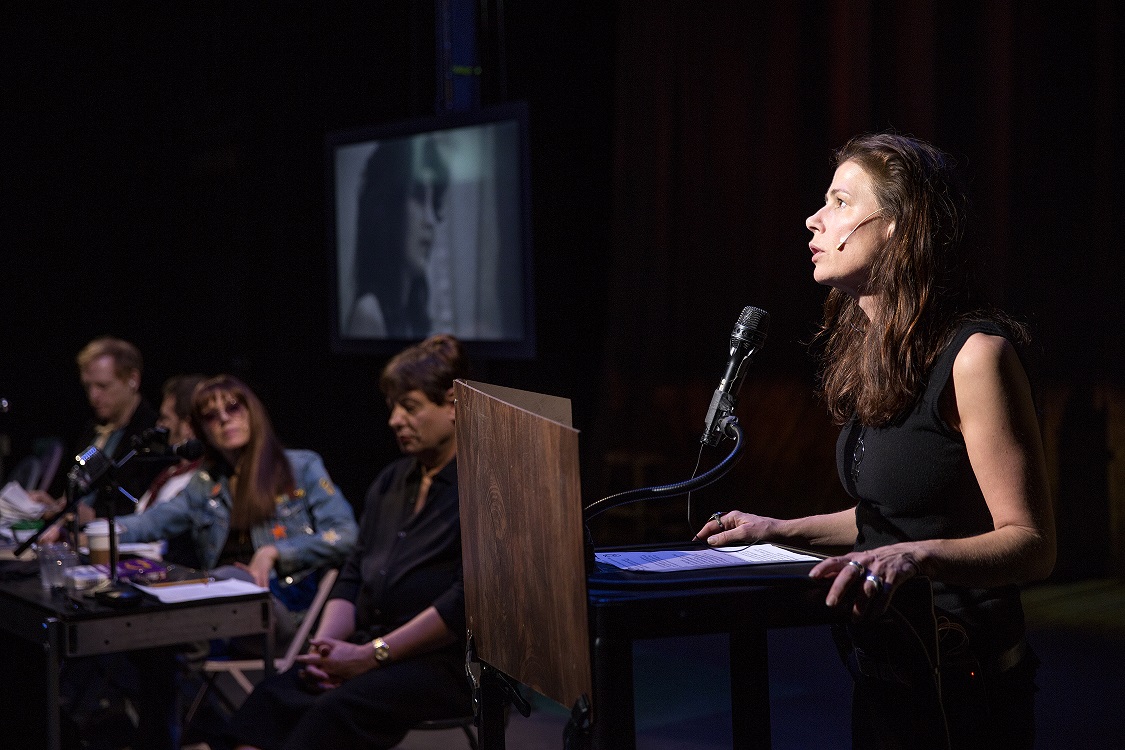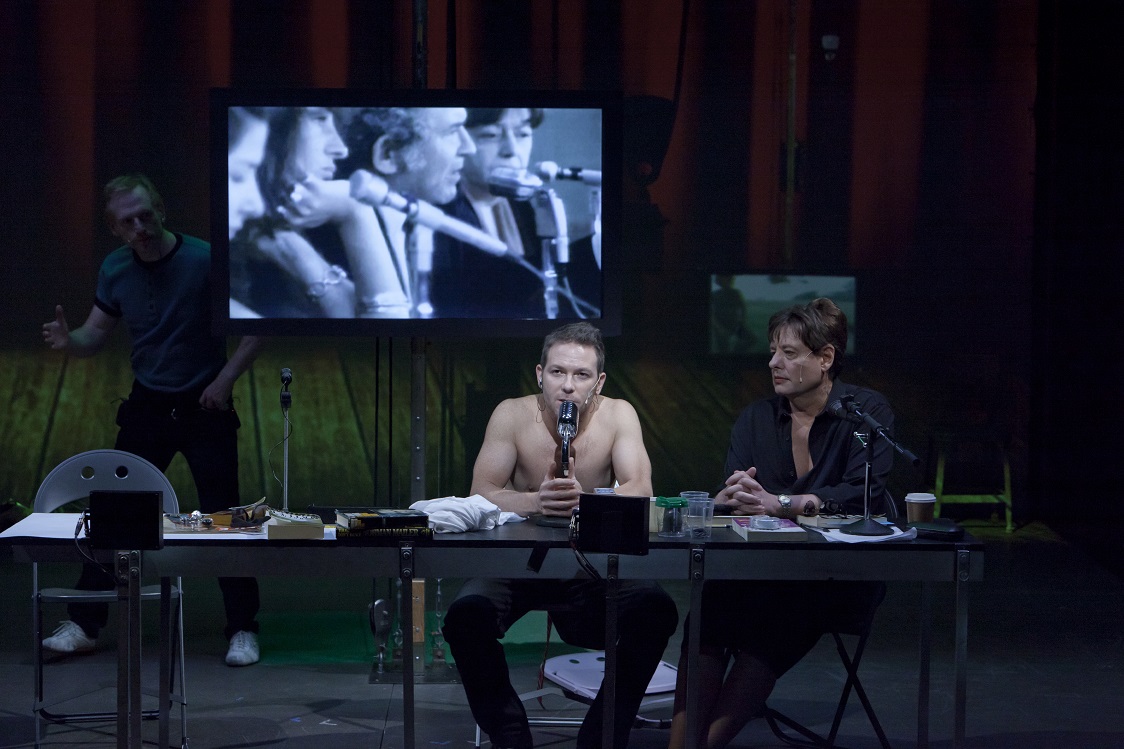Iconoclasm, orgasms, and rampant rhetoric are all on irrepressible display in The Wooster Group’s recreation of the 1971 Manhattan debate that pitted Norman Mailer against some of the leading feminists of the day. The evening proved almost as notable for who didn’t attend (feminists Kate Millet and Gloria Steinem refused to debate him) as who did (Germaine Greer, Lesbian Nation author Jill Johnston), but its electric anarchy resonates powerfully in today’s confused world.
The Wooster Group – under the simultaneously deadpan and excoriating eye of its director Elizabeth LeCompte – has been subverting theatrical spectacle for decades, so the question here is how do you subvert something that itself was inherently subversive? Mailer – attacked in 1970 by Kate Millett as a "prisoner of the virility cult" – was ostensibly on show to defend his penis (which he had named "the Retaliator") yet the fallibility of phallocentricity becomes the evening’s central outrageous theme.
This is a wilfully bonkers love-letter from another age
The entire auditorium is contained on the Barbican stage, which itself is set up as if for the original debate. Municipal chairs are ranged along tables with microphones while a large screen at the back and two smaller screens flicker with footage from the iconic 1979 documentary about the event, Town Bloody Hall. The actors playing Greer (Maura Tierney), Johnston (Kate Valk), and critic Diana Trilling (Greg Mehrten) – who delivers a strident defence of the vaginal orgasm – are therefore echoed on film by digitalised doubles whose energy erupts irreverently through the decades. (Pictured below, from left: Scott Shepherd, Ari Fliakos, Kate Valk, Greg Mehrten and Maura Tierney, by Steve Gunther)
Perhaps the production’s most interesting choice is to select Jill Johnston as the individual through whom we perceive much of the evening. The essayist and dance critic for The Village Voice declares, ‘"ll women are lesbians, except those who don’t know it naturally", arguing that without "les-berated women…there will be no political revolution." Yet suddenly you realise it’s a crucial moment in the debate, because it’s the point at which language breaks down: after Mailer, testily (testes-ly?) interrupts, "Jill, you’ve written your letter, now mail it,"’ the outrage turns to playful rebellion. Kate Valk’s skinny denim-clad Johnston is embraced by another denim-clad woman who rockets out of the audience – as they kiss, another woman joins them, before they all collapse onto the floor together to riotous laughter. What’s fascinating, watching this re-enactment, is to realise to the extent to which arguments and attitudes that seemed radical then have become orthodox in today’s society. Indeed, in an era transfixed by transgender issues, merely to defend lesbianism seems restrained, while, for instance, Greer’s articulate and passionate attack on the elite cult of the male artist comes across as common sense. Yet Johnston’s narrative describes the evening itself as a disaster, something that put many men and women off women’s rights for a long time afterwards.
What’s fascinating, watching this re-enactment, is to realise to the extent to which arguments and attitudes that seemed radical then have become orthodox in today’s society. Indeed, in an era transfixed by transgender issues, merely to defend lesbianism seems restrained, while, for instance, Greer’s articulate and passionate attack on the elite cult of the male artist comes across as common sense. Yet Johnston’s narrative describes the evening itself as a disaster, something that put many men and women off women’s rights for a long time afterwards.
We, however, as an audience have the luxury of decades’ hindsight. So even as this production celebrates the capricious carnivalesque impulses that led this debate to be the talking point of its time, it allows us simultaneously to gawp at a society that perceived its viewpoints as a fascinating novelty. It lets us see how those held up as absurd one day can be the prophets of the next. Through our wide-angle lens, we witness clearly how ridicule is all too often used as a weapon to promote conformity, and that here, especially, it is those who embrace it who pave the way to the future. Where does this leave Mailer, who at one point – determined not to be upstaged – sarcastically offers to "take out my modest little Jewish dick and put it on the table"? Here LeCompte has decided he is to be played by two actors – Ari Fliakos, who exudes saturnine smugness, and Scott Shepherd who acerbically spits out the poisoned barbs of his intellectual quibbles. It would be far too easy to dismiss him as a Y-chromosomed monster – the Wooster Group is, after all, above even a post-modern Punch and Judy show. More interestingly we are allowed to see Mailer’s own flaws and contradictions, not least through clips from his critically mauled film Maidstone, in which he plays a filmmaker running for president. (Pictured above: from left, Scott Shepherd, Ari Fliakos and Greg Mehrten, by Hervé Véronèse)
Where does this leave Mailer, who at one point – determined not to be upstaged – sarcastically offers to "take out my modest little Jewish dick and put it on the table"? Here LeCompte has decided he is to be played by two actors – Ari Fliakos, who exudes saturnine smugness, and Scott Shepherd who acerbically spits out the poisoned barbs of his intellectual quibbles. It would be far too easy to dismiss him as a Y-chromosomed monster – the Wooster Group is, after all, above even a post-modern Punch and Judy show. More interestingly we are allowed to see Mailer’s own flaws and contradictions, not least through clips from his critically mauled film Maidstone, in which he plays a filmmaker running for president. (Pictured above: from left, Scott Shepherd, Ari Fliakos and Greg Mehrten, by Hervé Véronèse)
At a time when the rule book is being rewritten again and again for all genders, this is a wilfully bonkers love-letter from another age. Even as we gawp, we ignore its lessons at our peril.















Add comment